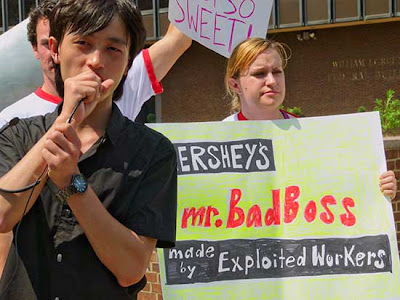
By Joseph Piette
Philadelphia
Published Aug 25, 2011 9:54 PM
Three hundred and seventy-five young adults from around the world paid between $3,000 and $6,000 to come to the United States for three months to work, learn English and experience this country’s culture. What they experienced instead was crass exploitation of their labor. What they learned was how to fight back — with a sit-in and a strike.
The students from Turkey, China, Ukraine, Kazakhstan, Romania, Mongolia, Moldova, Poland and Ghana signed up for the J-1 visa program, expecting to work at hotels, restaurants and tourist attractions for a couple of summer months, followed by the chance to tour the U.S. — a fun way to travel and gain cultural experiences while also earning money to help subsidize their trips.
They were instead forced to lift 50-pound boxes of Reese’s candies, Kit-Kats and Almond Joys from a fast-moving production line, one every minute for eight hours a day, in the graveyard shift for many of them.
The students, many from medical and engineering graduate schools, were paid $7.85 to $8.35 an hour and had to live in crowded Hershey Company housing (two to four or more to a room) for which they were each charged $395 a month — twice the rate for previous workers who lived there. After rent and other fees were deducted from their paychecks, guest workers took home as little as $40, too little to pay back their sponsor fees and travel costs.
On Aug. 17, the student workers staged the first sit-in against Hershey since 1937.
With the help of the National Guestworker Alliance and union officials, they stopped working. They demanded that Hershey return the $3,000 to $6,000 that each student paid to come to this country; fire subcontractor Exel, which recruited and lied to them; and give their 400 jobs — at higher wages and benefits — to Pennsylvania workers in desperate need of work.
Rick Bloomingdale, AFL-CIO Pennsylvania state president; Neal Bisno, president of SEIU Healthcare Pennsylvania; and Kathy Jellison, president of Service Employees Local 668, were arrested after the company refused them entrance into the packing plant to support the striking students. Guest workers were quickly escorted by police out of the warehouse and remain on strike as of Aug. 21.
According to Dennis Bomberger, the business manager of the AFL-CIO local union that represents Hershey’s chocolate workers, while the nonunion Hershey Eastern Distribution Center III in Palmyra, Pa., has grown, Hershey has reduced its full-time union employees by 700 since 2007, to a total of 1,500, with 500 more layoffs expected next year.
On Aug. 19, workers traveled to Philadelphia, Pittsburgh, New York and Chicago to publicize their struggle against Hershey.
In Philadelphia, four of them explained their fight to a large noontime rally for striking Verizon workers, ending their time on stage with the chant, “Give our jobs to local people!”
They later rallied with supporters in front of the federal building, energetically explaining their struggle for justice before marching by the Liberty Bell with the chant, “No justice, no sweets!”
Hershey’s guest workers’ experiences are not rare. In 2010, 353,602 students signed up for this unique program run by the State Department.
Employers have several significant financial incentives to hire J-1 visa holders rather than U.S. workers. The J visa has no prevailing wage requirement, which enables employers to pay J visa holders wages that are lower than those earned by U.S. workers in the same region and occupation.
Employers are exempt from paying Social Security, Medicare, and federal and state unemployment taxes on J-1 workers. And J visa holders — not the companies — are required to pay for health insurance coverage during their stay in the U.S. Guest workers are especially easy to exploit since if they speak up, they can be deported if companies withdraw their visa.
An Associated Press investigation of the visa program, published last December, found students who were forced to work in strip clubs instead of restaurants. Others took home $1 an hour or even less, some living in crowded apartments or eating on floors.










































No comments:
Post a Comment